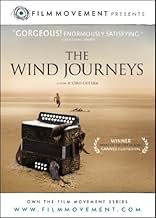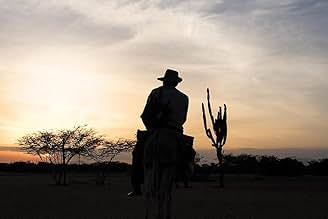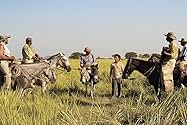IMDb RATING
7.4/10
2.6K
YOUR RATING
A musician travels a great distance to return an instrument to his elderly teacher.A musician travels a great distance to return an instrument to his elderly teacher.A musician travels a great distance to return an instrument to his elderly teacher.
- Awards
- 11 wins & 7 nominations total
Nibaldo Vergara
- Cowboy
- (as Nibaldo 'Niveo' Vergara)
- Director
- Writer
- All cast & crew
- Production, box office & more at IMDbPro
Featured reviews
Los viajes del viento (2009), shown in the U.S. as The Wind Journeys, was written and directed by Ciro Guerra.
This movie was fascinating to me because it opened up windows to a culture and a music with which I'm not familiar. The setting is rural northeastern Colombia, and the music is vallenato, in which the primary instrument is the accordion.
Los viajes is basically a road movie. The story is that a young man follows an older vallenato master as he wanders through rural Colombia, attempting to return an accordion which has mystical properties.
The plot consists of the people they meet, and the experiences they encounter on the journey.
Being unfamiliar with the region and its music, I can't comment on how accurately these are portrayed. The relationship between the man and the boy certainly doesn't conform to the feel-good connection that would surely develop in a U.S. film. Also, the entire movie is more like fantasy than realistic fiction or documentary. However, I admit that people from the region could say, "Actually, that's the way it is."
This is an unusual and fascinating movie, and definitely worth seeing. It will work better on a large screen than a small one, but it will be worth seeking out in either format. (We saw it at the Rochester 360-365 film festival which, despite its ridiculous name, is an excellent event.)
This movie was fascinating to me because it opened up windows to a culture and a music with which I'm not familiar. The setting is rural northeastern Colombia, and the music is vallenato, in which the primary instrument is the accordion.
Los viajes is basically a road movie. The story is that a young man follows an older vallenato master as he wanders through rural Colombia, attempting to return an accordion which has mystical properties.
The plot consists of the people they meet, and the experiences they encounter on the journey.
Being unfamiliar with the region and its music, I can't comment on how accurately these are portrayed. The relationship between the man and the boy certainly doesn't conform to the feel-good connection that would surely develop in a U.S. film. Also, the entire movie is more like fantasy than realistic fiction or documentary. However, I admit that people from the region could say, "Actually, that's the way it is."
This is an unusual and fascinating movie, and definitely worth seeing. It will work better on a large screen than a small one, but it will be worth seeking out in either format. (We saw it at the Rochester 360-365 film festival which, despite its ridiculous name, is an excellent event.)
Finally a film that plays that elusive music of soul that made one hooked to cinema in the first place.
This film maps the formative process of an artist from a spiritual perspective; the process of impregnating a forming soul with an experience so intense, complex and mystifying that the young soul will spend its entire lifetime trying to decipher its pain and meaning, and the only glimpses of its meaning will arrive through art, there is no other way.
This is a beautiful approach that emphasizes that a master's primary role is not in teaching the art or the skill to the apprentice, but to go a level deeper and impart in the apprentice the kind of experience that will automatically give birth to great art irrespective of the medium.
Contrast this film with Hollywood's treatment to the same theme, Walter Hill's Crossroads (1986), which superficially glosses over the experience part and ultimately succumbs to the glamorous but shallow pandering of the skill part.
This film maps the formative process of an artist from a spiritual perspective; the process of impregnating a forming soul with an experience so intense, complex and mystifying that the young soul will spend its entire lifetime trying to decipher its pain and meaning, and the only glimpses of its meaning will arrive through art, there is no other way.
This is a beautiful approach that emphasizes that a master's primary role is not in teaching the art or the skill to the apprentice, but to go a level deeper and impart in the apprentice the kind of experience that will automatically give birth to great art irrespective of the medium.
Contrast this film with Hollywood's treatment to the same theme, Walter Hill's Crossroads (1986), which superficially glosses over the experience part and ultimately succumbs to the glamorous but shallow pandering of the skill part.
A beautiful film that is in no hurry to unfold (and it shouldn't be because "being in a hurry" is not something the people in the movie seem to feel). Life is not easy here (you can see this etched into every character's face) but you persevere and along the way you look for, and create, beauty and kindness. I love the way the camera often moves backward, showing the characters moving from one environment into the next (they know where they're headed but we don't. The expressions on Fermin's face at the end are a complex wonder to behold (and a great topic for discussion afterward). If you are looking for an anxiety-inducing, misanthropic action-thriller then keep looking. If you want to see a poetic gem made by people who clearly see beauty in the world and know how to help us see it too, then settle down and enjoy "The Wind Journeys".
Road-movie, coming-of-age tale
check and check, but do not be mislead by these general film genre titles and the formulaic tropes that they often carry. Ciro Guerra's award-winning feature debut is much more. (By the way he was 27 years old when he filmed it). In a small village in Colombia, Ignacio (Marciano Martinez), a troubadour, has just lost his wife. In grief and in somewhat of an existential panic Ignacio sets out on a journey to return his unique accordion, known as "The Devil's Accordion," to his master Guerra who bestowed it upon him. The legend of the accordion and the mystical aura surrounding the existence of Master Guerra gives the film a powerful mystical undertone. Ignacio, on mule, soon discovers he is not alone on his journey, but finds a zestful teenager Fermin (Nunez) in tow. The dynamics of their relationship is to be expected: optimism vs. pessimism, willing student vs. reluctant mentor, a young man's passion for life vs. an older man exhausted by life, yet these simple tropes never comes off as tired and overly predictable. The Wind Journeys has a poignant intellectual life, confidently mixing humor and sadness, the air of the ethereal with the coarse naturalness of everyday life.
The true artistic and intellectual revelations of the film come from its aural and visual explosions. As can be seen and heard in the final sequence, the wind carries the music and the music the wind, as both roar audibly intertwined over beautiful shots of various landscapes of Colombia. The music is what drives the characters from stop to stop along the journey. "I don't play the accordion, it plays me," as Ignacio tells his young companion. Guerra has created pure filmic poetry through the characters discovering, rediscovering and embracing various cultural sights and sounds: like the intense, beautiful scene with one tribe's drumming initiation ceremony, where if you pass the test on the drums the players' hands are covered in the blood of a lizard.
The cinematography is gorgeous and as the film progresses the crane shots overlooking the majestic pastoral landscapes and the quiet roaming shots of something as simple as the wind blowing the vibrant, tall green grass on a hillside functions in almost a Terrence Mallick sense. The camera-work only helps to heighten the spiritual and mystic undertones, which Guerra strikes a perfect balance with; not allowing the story or the visual scope to bend too far into the land of magic-realism. Everything Mr. Guerra does is balanced: emotional with mundane, mystic with the natural. The natural but existential quandaries of the characters and how they relate to one another and how they relate to the ebbs and flows of the overflowing cultural magnificence of the world in which they are passing through makes for truly refined and sublime filmmaking.
The true artistic and intellectual revelations of the film come from its aural and visual explosions. As can be seen and heard in the final sequence, the wind carries the music and the music the wind, as both roar audibly intertwined over beautiful shots of various landscapes of Colombia. The music is what drives the characters from stop to stop along the journey. "I don't play the accordion, it plays me," as Ignacio tells his young companion. Guerra has created pure filmic poetry through the characters discovering, rediscovering and embracing various cultural sights and sounds: like the intense, beautiful scene with one tribe's drumming initiation ceremony, where if you pass the test on the drums the players' hands are covered in the blood of a lizard.
The cinematography is gorgeous and as the film progresses the crane shots overlooking the majestic pastoral landscapes and the quiet roaming shots of something as simple as the wind blowing the vibrant, tall green grass on a hillside functions in almost a Terrence Mallick sense. The camera-work only helps to heighten the spiritual and mystic undertones, which Guerra strikes a perfect balance with; not allowing the story or the visual scope to bend too far into the land of magic-realism. Everything Mr. Guerra does is balanced: emotional with mundane, mystic with the natural. The natural but existential quandaries of the characters and how they relate to one another and how they relate to the ebbs and flows of the overflowing cultural magnificence of the world in which they are passing through makes for truly refined and sublime filmmaking.
Different to the classic Colombian movies. A journey throw the diversity of the Caribbean cost of Colombia, its people and its music.
Refreshing and well made.
It is very interesting that the lead actor is actually a well known Valletano singer. His songs a lot more popular than his funny name: Marciano.
The selection of songs along the movie is perfect. Traditional Vallenatos that this movie will always help to remember.
Ciro Guerra, the director, is making a great effort to show people around the world the most beautiful and forgotten places of the north region of Colombia.
Refreshing and well made.
It is very interesting that the lead actor is actually a well known Valletano singer. His songs a lot more popular than his funny name: Marciano.
The selection of songs along the movie is perfect. Traditional Vallenatos that this movie will always help to remember.
Ciro Guerra, the director, is making a great effort to show people around the world the most beautiful and forgotten places of the north region of Colombia.
Did you know
- TriviaColombia's official submission to 82nd Academy Award's Foreign Language in 2010.
- ConnectionsFeatured in TCM Guest Programmer: Patton Oswalt (2013)
- How long is The Wind Journeys?Powered by Alexa
Details
- Release date
- Countries of origin
- Official site
- Language
- Also known as
- Путешествия ветра
- Filming locations
- Production companies
- See more company credits at IMDbPro
Box office
- Gross worldwide
- $10,988
- Runtime
- 1h 57m(117 min)
- Color
- Sound mix
- Aspect ratio
- 2.35 : 1
Contribute to this page
Suggest an edit or add missing content























